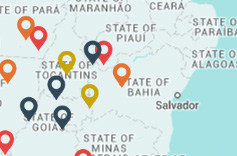Association of Rural Women Workers from the Junco and Rodrigues Lakes (AMTR)
Women of fiber: stripping bark and reinventing life through the struggle for gender, race, and ethnic equality
Maranhão
Objetivos e público prioritário
With the project “Women of Fiber”(1), the association plans to train women leaders to act in community organizations as multiplier agents for rural development with focus on gender, race and ethnicity.
The idea is to strengthen the political organizations of the nut breakers, sharing the experience of 102 women from AMTR to 200 other nut breakers through Babaçu Nut Breakers Study Group.
This study group was designed by the nut breakers themselves, which meant the establishment of a very important political space for training and empowerment of women.
(1) “Women of fiber” or, in Portuguese, “mulheres de fibra”, are
very strong woman, empowered and capable of fighting for what they want
and need and overcoming obstacles.
Context
The project, proposed by AMTR, is the result of the fight historically pursued by the nut breakers for access to rights (regarding production, political and social participation and access to knowledge).
The rights movement took place in a context of babaçu nut breakers extreme need for survival, which began in 1980s. At that time the lands of Médio Mearim started to be used for pasture for extensive livestock raising, concentrated in the hands of large landowners.
From 1990 to 1996, the land was returned partly into the hands of small and medium landowners (up to 500 hectares). The return of land to these farmers was accompanied by the greatest land conflicts in the region, causing human rights violations and widespread environmental destruction processes (fires, use of agro-chemicals, introduction of harming plants, soil compaction, destruction of babaçu trees and groundwater).
The combination of these factors increased the incidence of problems such as rural exodus, extreme poverty, food insecurity and lack of educational processes of those who fought and won back their land.
Among those involved the greatest victims are the women nut breakers because they are the target of discrimination on the grounds of gender, race, ethnicity, production/economy, education and politics.
About the organization
The association’s mission is to build alternatives of sustainable social, political and economic development through community organization, rescue of popular knowledge in health, babaçu agriculture/agroextractivism and environmental education. The NGOs also fights for quality food, housing, land tenure, environmental preservation and ways to strengthen the family agriculture.
Located in Lake Rodrigues, 330 km from the capital São Luís, the association was set up by leading women babaçu nut breakers. It works with nut breakers from 11 communities in the microregion of Médio Mearim.
The activities are carried out in three spheres: training (study groups on gender empowerment, organization and political participation), protection of babaçu trees (lobby for the adoption of environmental laws and fight for law enforcement in both cities) and income generation (use of the extractivism of babaçu).
Funding Line
Annual Call for Proposals
Year
-
Total Granted
R$ 20,278.00
Duration
12 months
Main Themes
Women’s Rights






